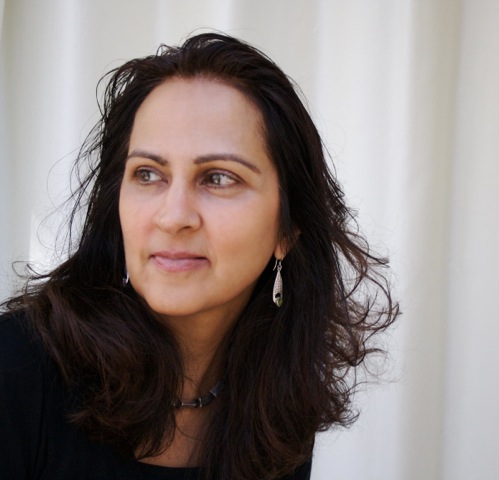Nikesh Shukla is one of the most exciting voices of our time. I remember when I interviewed many years ago. He was just figuring out who he was as an artist and I was somewhat in awe of his courage even then. I’ve interviewed him several times since and he’s one of the loveliest authors I’ve spoken to; warm-hearted and refreshingly honest. This year, Shukla has stepped into a more confident, self-assured role. His crowdfunded collection of 21 essays by BAME writers, The Good Immigrant topped the bestsellers list. He’s fronted several diversity initiatives and been the catalyst for much-needed change in the publishing industry. Most recently, he has been named as one of Foreign Policy magazine’s 100 Global Thinkers for 2016 and appeared on the Bookseller 100, a list of the most influential people in the book trade.
Since the publication of The Good Immigrant, edited by Shukla, the author has been immensely busy and I’m grateful that he’s stepped out of a meeting to take my call. I tell him that we’ve chosen him for our Writer of the Year and congratulate him on an amazing year. In typical Shukla fashion he tries to step out of the limelight. “The political landscape has been horrible which had made our book timely, so you’re like trading off book success for horrific political times, so part of me doesn’t know how to feel about it because you’re like ‘Am I profiting from the fact that our country has regressed and there is a rise in the far right?’ So I feel conflicted about the success of this specific book.”
I was expecting him to be like this, pushing the focus away from himself, so I’m quick on my feet to bring this back to him. I re-assert that the decision wasn’t simply about the success of The Good Immigrant but him personally. He’s managed to find his voice in a space and at a time when it is increasingly difficult to do so. Does he feel like he’s come into his own? “I think a lot of things happened last year that made me question what I want, why I wrote and what I wanted to achieve with my writing,” he says. “At the beginning of last year my beloved agent left agent-ing to go into editorial and I ended up rushing into writing a third novel which fit into the narrative and followed Coconut Unlimited and Meat Space and I was thinking what am I going to do about having an agent and I had this manuscript and I started approaching people but then I realised that this manuscript wasn’t where I wanted to be as a writer and I shelved it because I wrote it as a distraction from the novel that I needed to write.” Shukla’s third novel is a structurally ambitious novel that tells the story of a dysfunctional family across three generations. It’s set across parts of the UK and Kenya and follows the immigration journey, partly based on his own family’s journey. The One Who Wrote Destiny is set to be published by Atlantic Books in 2018.
I ask him what he makes of being touted as a diversity campaigner. He tells me that in the past, he’s been a reluctant activist, but is learning to take ownership of the role he is playing. He’s optimistic and has been delighted that his campaigning is already making waves. Lately, he’s been involved in the Penguin Random House Write Now Live scheme which has opened doors for writers of colour. “Things are starting to progress,” he says. ‘We’ve moved on a bit which is really exciting because it shows that these conversations are having an impact and they’re helping people to think about the stuff that they are doing and they feed into the wider narrative because it’s not just me who’s saying this.”
I wonder if any of ‘this’ (as important as it is) is distracting, especially to a writer, who may just want to write. “In an ideal world I could just sit at my desk and write,” he says. He does however, make time to write in the evening. “I have a very regimented life. My day job involves me being on social media so I don’t need to be on social media in the evening or at certain times of the day and when you’ve got young kids, routine is everything. I don’t go out.” He writes in the evening mostly, working between 9 pm – 12am to do writer admin; responding to emails, answering email interviews, though he admits he hasn’t written anything new recently except for a short story that was published in the anthology, How Much the Heart Can Hold.
In 2017, and a nod to the routine Shukla has become accustomed to, he’s planning some long-overdue time off. He expects there to be a long period of hibernation when he’ll be focusing on his family and researching his next novel. I don’t quite believe him when he says he’ll be taking a step back for a whole six months because for me he’s always evolving, he’s always doing something. But then as I take a moment to pause, he offers a glimmer of hope: ‘The Good Immigrant started off as a whim and it’s become the biggest thing I’ve done so there might be something else like that.’
Nikesh Shukla is the editor of Rife Magazine, an online magazine for young people and the author of the novels Coconut Unlimited (Quartet) which was shortlisted for the Costa First Novel Award and Meatspace (Friday Project). He is the editor of the acclaimed collection of essays about race and immigration by 21 writers of colour, The Good Immigrant (Unbound), for which he was shortlisted for the Liberty Human Rights Arts Award and won the reader’s choice category at the Books Are My Bag Awards.
(Image credit: ShamPhat Photography)

